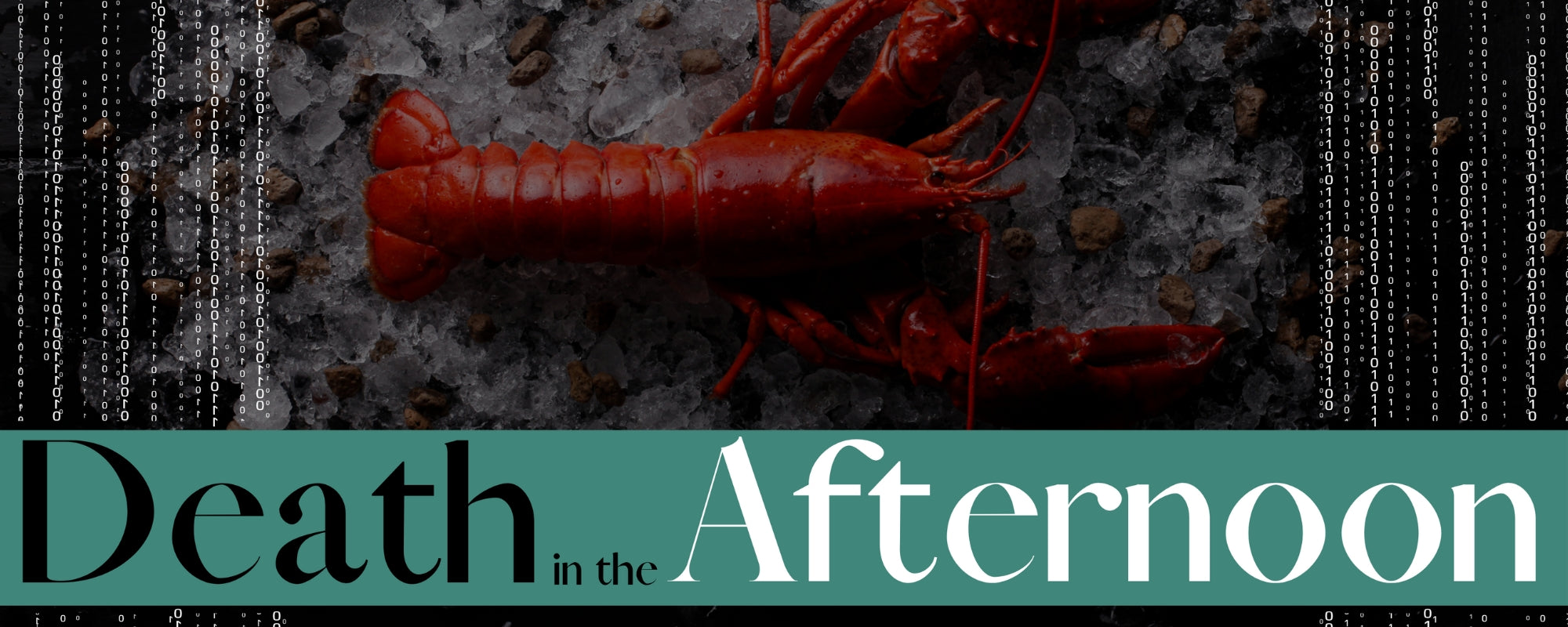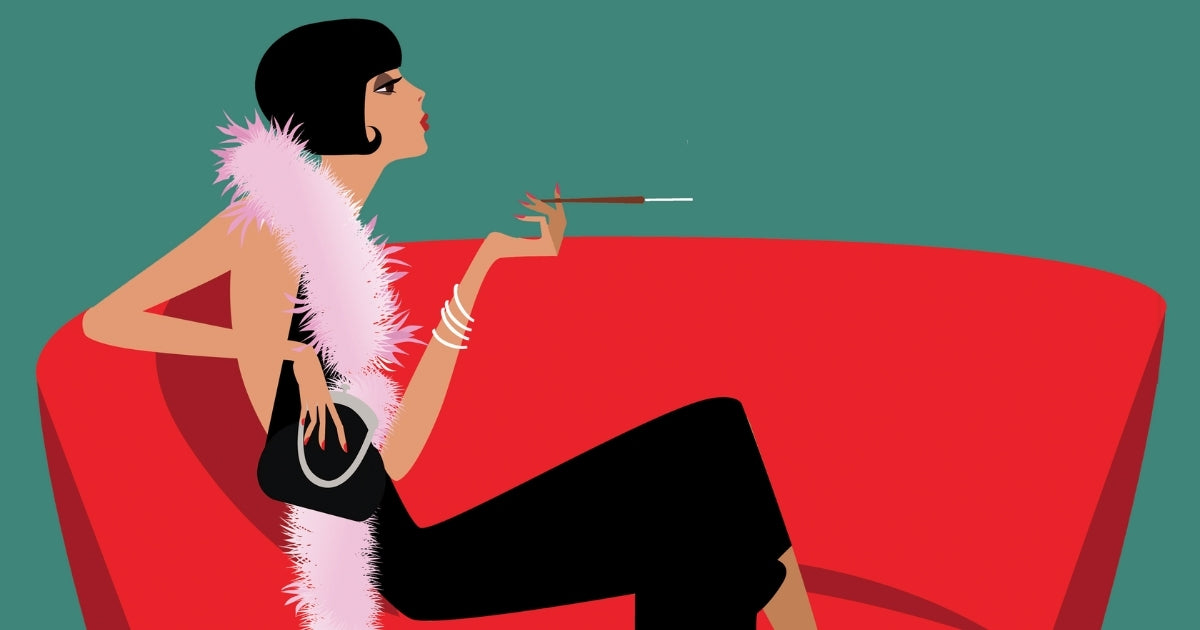

Death in the Afternoon
By John G. Wimer
Audio Narration by Aaron Sinn
Lester frowned at the bright red lobster on the center of his plate. Flanked by a glistening yellow ear of corn and a pile of steamed asparagus, the lobster appeared to be staring back up at the shaggy-haired man.
“You reckon they scream when they’re dunked into boiling water?” he asked morosely.
“Do they scream?” asked Alfred, a rotund, sharply dressed man seated at Lester’s right. “Don’t be absurd!”
Alfred finished his corn cob and used a cloth napkin to wipe butter from his bushy, salt-and-pepper mustache.
“Our cousin says they scream,” rejoined Lester. “At least sometimes they do. And she’s from Maine—right on the coast—so she should know.”
Alfred refilled his wine glass. “For Pete’s sake, Lester! Lobsters don’t even have vocal cords! How could they scream?”
Vanquished, Lester looked down at his plate and fidgeted with his lobster pick.
A lady to his left came to Lester’s rescue. “It could be the air trapped inside their stomachs,” she offered quietly.
Her brown hair was streaked with gray, and her countenance bore a striking resemblance to Lester’s.
She turned to Alfred. “The air would expand as the lobster heats up. It could make a hissing sound as it escapes the shell. One might mistake that for a scream.”
She offered her hypothesis without emotion, her large, unblinking brown eyes shifting between Lester and Alfred.
Alfred ripped a claw from his lobster. “I already knew that, Bessie. But thanks for explaining it for Lester.”
“Well, I bet they’d scream if they could,” Lester muttered. “I mean, if they did have vocal cords.” He spun his plate around so that the lobster faced away from him. “Do you think they suffer?”
“Absolutely not!” Alfred cracked the claw and pulled out a chunk of white meat. “Suffering requires consciousness. The ability to contemplate oneself as an independent being in the past, present, and future. Lobsters, most certainly, are not conscious beings, and I seriously doubt they’re even aware of their own existence. They’re mindless, unthinking invertebrates—like bugs and worms—with extremely primitive nervous systems. They don’t have a brain that thinks in the sense we humans do.”
Lester shoveled an asparagus spear into his mouth and pointed his empty fork at Alfred. “I wouldn’t be so sure about that. Our cousin—the one who lives in Maine—says lobsters thrash around when you put ’em in the boiling water.”
Alfred groaned and emptied his wine glass.
Lester turned to Bessie and continued, his voice becoming more earnest. “Tell him, Sis! Isn’t that what our cousin told us? Those lobsters try to climb the heck outta there—outta the pot! Doesn’t seem mindless or brainless to me.”
Alfred threw his hand in front of Lester’s face and snapped his fingers.
Lester blinked, turning his head away. “Hey! Cut it out! What are you—”
“Why did you blink?” Alfred interrupted. “Did you think to yourself, ‘Alfred is going to punch me in the face, so I better close my eyes?’”
“Of course not,” Lester muttered. “I just blinked.”
“Right. It was an involuntary, defensive reflex that required no thought on your part. When lobsters are confronted with a noxious stimulus—”
“You’re a noxious stimulus!” Lester chuckled at his interruption and looked at Bessie. “Wouldn’t you agree?”
Bessie smiled. “I think Alfred’s inherent obnoxiousness is amplified when he’s drinking. Perhaps you should confiscate that bottle, Lester.”
“As I was saying,” Alfred continued, “when lobsters are faced with a noxious stimulus, such as boiling water, they respond reflexively, the same way you did when I snapped my fingers in your face. Their thrashing around is just muscle reflex. They are not mindful, or conscious, of what’s going on.”
“You can’t prove that,” Bessie replied quietly, unaware that a corn kernel was stuck to her chin. “Really, Alfred. How could we possibly know what goes on in another organism’s mind, no matter how primitive it may be?”
Alfred extracted a long section of meat from his lobster tail and dipped it into a bowl of melted butter. “Allow me to elaborate. When I tap the knee of a patient to test his patellar reflex, a signal is transmitted along a neural pathway to his spinal cord, which in turn sends an impulse directly back to his muscle, causing his leg to kick. The brain, mind you, is not involved at all in this reflexive action—it’s completely out of the loop.”
“Yeah, but he’d still feel it when you hit his knee,” Lester replied. “It might even hurt a little.”
“That’s true,” Alfred continued. “Simultaneous to the reflexive signal, a sensory signal is, indeed, sent up the spinal cord to the brain, notifying the patient his knee has been struck. However, even if the patient’s spinal cord was fully transected, preventing the sensory signal from reaching his brain, the reflexive action would still occur. I’ve observed this myself
when examining patients with spinal cord injuries. In fact, if I put a blindfold on such a patient, he would be completely unconscious of the entire event—from my tapping his knee to the kick of his leg.”
Alfred tapped the head of his lobster with his finger. “Such is the experience of a lobster to noxious stimuli. Its primitive nervous system is not integrated with a thinking brain, so the lobster is not, in fact, conscious of its reflexive actions nor the stimuli that caused them. Lobsters are merely organic automatons—unthinking machines that happen to be alive, but just don’t know it.”
Bessie nodded her head. “You might be right, Alfred. I’ll give you that much. But you can’t be absolutely sure. The only thing that one can be absolutely certain of is the existence of one’s own mind. Cogito, ergo sum.”
“Oh please,” Alfred retorted, “Don’t start with that dribble.”
Lester furrowed his brow. “Cogito, er–”
“Cogito, ergo sum,” Alfred interrupted. “I think, therefore I am.” He said it in a sing-song voice. “Abstract rubbish.”
Bessie’s dark eyes flashed with anger. “It’s hardly rubbish, Alfred. It’s a foundational element of Western philosophy—the basis of everything I’ve taught at the university for twenty years.”
Turning to Lester, she continued. “It goes back to the seventeenth century French philosopher, René Descartes. He began with the proposition that one cannot be absolutely sure that the things perceived by one’s mind actually exist. The external world you think you see, hear, smell, and touch could just be a figment of your mind’s imagination. Consequently, their very existence must be called into doubt. The only thing in the universe one can be sure about is the existence of one’s own mind. For the very act of doubting the existence of one’s own mind proves that it exists—otherwise there could be no mind to do the doubting.”
Lester scratched his head and nodded. “Yeah, I think I get it. Cogito, ergo sum. That’s far out.”
Alfred chuckled. “Far out, indeed. Such is the distinction between her College of Liberal Arts and my College of Natural Science.”
“Oh, come off it, Alfred,” Bessie grumbled. “Even you must agree it makes sense. It’s just logic, after all.”
“No, I don’t agree!” Alfred protested. “It’s too limiting! It’s, it’s…just wrong! I can be certain that the world around me exists.”
He slapped his hand down on the tabletop. “This table exists! I can feel it! This, this food! It exists! I can taste it!” Alfred thrust the end of an asparagus spear into his mouth and chewed it violently. Outside his lips, the free end flopped about wildly, like a big green worm being chopped into pieces.
“But our senses can deceive us!” Bessie countered. “As you just explained, they’re really just a series of impulses that are received by our brains.”
She reached across the table and took Alfred’s hand in her own. “Right now, your mind has concluded that I’m touching your hand. But your mind isn’t actually feeling my hand; it’s just interpreting an impulse your brain is receiving. And you can’t know for sure where that impulse came from. Perhaps it originated from the nerve endings in your hand. Perhaps not. Perhaps your mind just imagined the feeling.”
“Like those soldiers with amputated limbs,” interjected Lester. “I saw on television that sometimes they still feel pain. It’s like their amputated legs or arms are really still there and they’re hurting.”
“Yes,” Alfred replied, “but despite such phantom pains, amputees know that their missing limbs no longer exist. They rely on their other senses…their memories…the testimony of others—a whole host of evidence that proves to them the amputated limb is not actually there. They realize the phantom pain is just…just a glitch in their system. And despite such glitches in one’s perception, a sane, rational person can easily rule out any of the absurd notions they may suggest.”
“Your reasoning is flawed, Alfred,” Bessie said cheerfully, “but you affirmed my main point nonetheless. Call it a glitch if you want to, but you’ve admitted our sense of touch can, in fact, tell us something exists when it really doesn’t. And if that can happen with one of our senses, who can say it can’t happen with all of them simultaneously? And who can say the resulting illusion—or hallucination, if you prefer—must always be absurd? The illusion could be as mundane as drinking a cup of coffee or reading a newspaper. As I stated before, the only thing one can be absolutely certain of is the existence of one’s own mind. Pompously insisting that you’re certain about anything else is what’s truly absurd.”
Alfred’s face flushed red, and he picked up his drinking glass. “Tell me then, Bessie, is this”—he flung the wine from his glass into her face—“an illusion? Or are you really all wet?”
Lester sprang up from his chair. “Really, Alfred! You’ve gone too far! As long as we’ve been friends, for you to act in such a way! I…I should give you–”
Bessie grabbed Lester’s arm. “Don’t, Lester. It’s okay. Really, I’m fine.”
After dabbing her face dry with a napkin, she got up and offered her arm to Lester. The two walked away from the table without another word.
“Hey, Lester,” Alfred called out from behind them, “since it looks like I’ll be getting the check, do you mind if I eat your lobster? I’d hate for him to have suffered so much for nothing.”
🦞
A chilly breeze, damp and refreshing, wafted through Bessie’s living room window, carrying with it the sweet perfume of her climbing Iceberg rose bushes.
Alfred leaned his head back in the soft, wingback chair and closed his eyes. Crickets chirped in the garden. An empty, long-stemmed glass was clutched in his hand.
Across from him, Bessie and Lester sat on opposite ends of a large couch, playing rummy. The cascading discard pile and a large bowl of chips lay on the cushion between them.
Alfred let out a long groan—equal parts satisfaction and fatigue—and opened his bloodshot eyes.
Bessie played a card and looked over at him. “Ready for another drink?”
“Maybe just one more, then I need to get home.”
Bessie got up and took Alfred’s glass. “Are you sure you don’t want to stay and play some cards? Lester was hoping for some poker, but that’s no fun with just two.”
“No, no. I need to go.” Alfred replied. “Besides, you’re too good at bluffing. I never know what’s going on behind that stoic façade of yours.”
Bessie stepped towards the kitchen. “You just don’t like to lose.”
When she was gone, Alfred said to Lester, “I was surprised your sister invited me over, considering my, er, regrettable behavior last month. Not that I remember much of it.”
“She insisted on it.” Lester stuffed a handful of chips into his mouth and continued talking while crunching them between his teeth. “If it’d been up to me…Well, I dunno.”
“Bessie may not match me intellectually,” Alfred pronounced, “but at heart, she’s a better person than I am.”
Lester chuckled. “Man, you have it all wrong.” He continued to chortle, shaking his head. “You’ve got it all backwards.”
Bessie returned with Alfred’s cocktail. Absinthe clouded the champagne with a pale green milkiness, and its surface bubbled with iridescent foam.
Alfred greedily accepted the champagne flute and took a sip.
“Mmmmm.” He smacked his lips. “Tastes more bitter this time.”
“I made it just like the others. Hemingway’s recipe to the letter.”
“Who’s Hemingway?” Lester asked, yawning.
“Who’s Hemingway?” Alfred guffawed, then took another sip of his drink. “Hemingway—Ernest Hemingway—was a renowned American author. He won the Nobel Prize for Pete’s sake! The Old Man and the Sea. The Sun Also Rises. Classics of American literature, one and all. For Whom the Bell–”
“He was also a prodigious alcoholic,” Bessie interjected, “who happened to invent a couple mixed drinks.”
“Including this decadent concoction! The Hemingway Cocktail!” Alfred lifted his glass for emphasis and, losing his balance, nearly fell forward out of his seat.
Bessie caught his arm and pushed him back into the wingback chair. “But surely you know, Alfred, that Hemingway had a different name for this particular cocktail.”
“Oh, yeah? And what might that be?” Alfred’s face was slack, and his speech slurred.
Bessie smiled sweetly. “He called it ‘Death in the Afternoon.’”
Alfred’s glass slipped from his hand and fell to the floor. Eyes closed, his head lolled to rest against one shoulder.
🦞
As Alfred slowly regained consciousness, he dreamed he was weightless—an astronaut floating outside a space capsule. Brilliant sunshine, undiluted by Earth’s atmosphere, radiated against him, broiling him like a turkey in an electric oven. Soaked in sweat, he desperately tried to reenter the capsule, but found he could not lift his arms to turn the door latch. In horror, he realized that the long, braided steel cable that tethered him to the capsule had become tangled around him.
“Emergency! Assistance needed!” He sputtered the words into his helmet microphone, panic creeping into his trembling voice. “Please! Someone come help me!”
As he awaited a reply from his crewmates, the heat became unbearable. Desperate to free himself, Alfred twisted his body, flailing his hands and kicking his legs, but the coils encircling his ankles and elbows held tight. His profuse perspiration seemed to fill every void in his spacesuit. Its salty aroma permeated his nostrils. Fatigue set in as he continued to struggle, and blobs of darkness began to invade his peripheral vision. Just before the blackness became complete, the speaker in his helmet crackled to life.
“There, there, Alfred,” intoned a soft, female voice. “Just relax. It’s pointless to struggle. You can’t possibly free yourself.”
Alfred’s eyes fluttered open. The darkness was gone, but the oppressive heat remained. He looked from side to side, slowly taking in his surroundings as his mind emerged from a dense fog.
He was on Bessie’s back porch, reclining in her small, two-person hot tub, submerged to his collarbones. The water was uncomfortably hot, and redolent of salt and pepper. Bessie and Lester sat at a nearby patio table, peeling onions and carrots.
Alfred looked down into the hot tub. The jets were turned off, so the water was clear and placid. He was stripped to his boxer shorts, and his ankles and wrists were bound together with plastic zip ties. A rope encircled his elbows, cinching his arms to his sides. A second rope pressed against his chest and armpits.
Alfred tried to get up, but the rope around his chest held him firmly in place. He kicked his feet, bending his legs at the knees, but this only served to buoy his lower body a few inches up in the water. Despite his strenuous effort, the surface of the water barely rippled, and his chest and shoulders did not budge at all.
“I told you it’s futile,” Bessie said. “You’ve been thrashing in your sleep for the past half hour, and it’s gotten you nowhere.”
“Yeah,” Lester chimed in. “You’re still trussed up like a fat pig!” Lester puffed out his cheeks and pretended to struggle away from his chair. “How’s the water, by the way?”
Alfred smirked. “It’s a trifle too cool for my liking. Thanks for your concern.”
Lester chuckled. “Don’t worry, it’ll get a whole lot warmer before too long.”
Alfred thrashed about in the hot tub once again. “Release me at once!” he demanded. “Have you lost your minds?”
“What were you dreaming about?” Bessie asked. Her voice was soft and flat.
“I said, ‘Let me go!’” Alfred screamed the words, his face livid with anger.
Lester shook his head and smiled wryly. “I told you we should’ve stuffed an apple in his mouth.”
“Not to worry,” Bessie replied. “No one can hear him. Our nearest neighbor is five miles away.”
Turning to Alfred, she continued, “Now, tell us about your dream, Alfred, and we’ll let you go.”
“You’re insane! Both of you!”
“Then indulge us!” Bessie pleaded. “Indulge your mentally ill inferiors so they’ll let you go. Tell us your dream!”
Bessie picked up a large red mixing bowl from the tabletop and walked over to the hot tub. She scooped out a cup of seasoning and dumped it into the water over Alfred’s feet. He watched as it sank through the water, slowly dissolving until it completely disappeared.
Bessie dipped her index finger into the water and tasted it. Suppressing a cough, she looked at Lester. “I think that may be enough, but let’s wait and see.”
Dumbfounded, Alfred watched as she carried the bowl back to the patio table and reclaimed her seat.
“So, this is a game, is it? Some kind of sick, twisted game?” Alfred shook his head and rolled his eyes. “Okay, I’ll play your pathetic little game. Then you must let me go!”
“Proceed,” Bessie replied. “And just so you know, you were talking in your sleep, so we’ll know if you’re lying.”
Alfred blushed. “Well, if you must know, I dreamed I was an astronaut. That, along with medicine, was one of several occupations I aspired to as a child. Anyway, I dreamed there was an accident during a spacewalk. I got tangled in my tether and couldn’t get back into the capsule. Heat from the sun overcame me, and I blacked out.”
“How do you know it was a dream?” Bessie asked.
“What on earth do you mean?”
“Maybe it wasn’t a dream. How can you know for sure? How can you know whether you’re a medical professor who just stopped dreaming he was an astronaut, or an astronaut who just started dreaming he was a medical professor? Maybe you really are an astronaut, unconscious and floating in space, dreaming about the hot tub and me and Lester.”
Perspiration ran down Alfred’s forehead and dripped from his eyebrows and nose. He blinked his eyes. “Please, Bessie. Don’t start with that philosophic mumbo jumbo again. You’re just being absurd.”
“Absurd? Really? Tell me, Alfred, which is more absurd? That you’re an unconscious astronaut floating in space? Or that you’re being boiled alive by a lady friend whom you’ve just discovered is a cannibal?”
“A cannibal!” Alfred snorted. “Really?”
“Yes, Alfred. Really. Make no mistake about it. Lester and I intend to eat you for dinner.”
“He’ll be good for several dinners,” Lester remarked.
“If you expect me to believe that—”
“I don’t expect you to believe anything,” Bessie interrupted. “But what are your senses telling you? Can’t you feel that the hot water is getting hotter? Can’t you see that your red skin is getting redder?”
“Yeah,” Lester said, “just like a lobster!”
“You can’t boil someone in a hot tub!” Alfred objected. “They have a safety mechanism that limits the temperature.”
“Oh, yeah?” Lester asked. He grabbed an object on the table and held it up for Alfred to see. It appeared to be a circuit board with a couple loose wires dangling from its sides. “This gizmo is what controls the temperature, Alfred. It was easy to bypass. Learned how to hack it on the internet.”
“Let me go!” Alfred raged. “I told you about my dream, now do as you promised!”
“My poor, naive, Alfred,” Bessie purred. “You really shouldn’t put your faith in the word of a cannibal now, should you? At least we had the decency to give you something to dull the pain—one of the little extra ingredients I mixed into your cocktails this afternoon.”
Alfred gritted his teeth, glowering back at her.
“Of course, you, being a doctor, would know that pain isn’t actually real—not in the sense you can see it or hear it or touch it. Pain is just the way your brain manifests a particular type of sensory information. It’s merely a psychological construct—a phantasm of the mind.”
Bessie gathered the peeled onions and carrots off the tabletop and placed them in the red mixing bowl. She walked back over to the hot tub and dumped the vegetables into the water, along with a few cups of seasoning that remained in the bowl.
Bessie put the bowl aside and ran her fingers through Alfred’s sweaty hair. “When it comes to pain, darling, it’s true what they say: it really is all in your head. Have you ever heard of the thought experiment called ‘brain in a vat?’”
Alfred lowered his head, pressing his chin to his chest. “Please, Bessie,” he moaned, “Just let me go. The water…it’s burning me!”
Still playing with Alfred’s hair, Bessie continued, “It’s a hypothesis about a human brain that’s been surgically removed from its donor’s skull and placed in a vat of fluid that nourishes and protects it. Electrical signals are transmitted from a computer to the brain’s neurons, simulating the sensory feedback a brain would receive from an actual body. The brain sees, hears, smells, tastes, and touches, all the while unaware that the complex, virtual reality created by the computer doesn’t actually exist. So, the question is, Alfred, how can anyone be sure that the world they think they live in is actually real? How can you be certain you’re not a disembodied brain, floating in a vat, living in a computer-generated reality? I maintain you cannot know this. The only thing you can be certain of is your own existence, or at least the existence of your own mind. All else is unsure.”
“Cogito, ergo sum,” Lester said.
Alfred groaned. His breathing was heavy and rapid.
Bessie ran her fingertips down to Alfred’s temples and felt the veins bulging from his skin. “Oh my, Alfred! How your heart is pounding! Seems like your body’s doing its utmost to deal with the predicament you’re in. Hyperthermia, they call it. I’ve done some research on what happens.”
Bessie tilted back Alfred’s head and looked into his eyes. They drifted from side to side, struggling to focus.
“Feeling woozy?” she inquired. “It’s because blood’s being diverted from your brain to the vessels in your skin. It’s your body’s desperate attempt to reject some heat and cool you down. Your core temperature is nearing the point at which your body tissues will suffer irreversible damage, when the proteins in your cells are literally cooked, just like a hard-boiled egg.”
“Mmmm,” Lester said. “I like eggs.”
“Oh, look!” Bessie said happily. “Bubbles! The water’s finally beginning to boil, Lester!”
“It sure took long enough,” Lester replied. “I’m starving. Let’s throw in some noodles! We’ll call it Pasta Alfredo!”
Alfred looked down into the water. Small bubbles were, indeed, erupting between the bobbing onions and carrots. “Heaven…have…mercy!” he stammered, gulping air between each word. Then he slumped forward, mercifully unconscious.
🦞
A few hours later, Alfred lay on the couch in Bessie’s living room, dressed in an ill-fitting pink bathrobe. Bessie and Lester sat across from him in matching wingback chairs.
“I know you’re angry with us,” Bessie said, “but you must admit you had it coming.”
Alfred tried to sit up and failed. “My skin is still burning,” he growled. “You scalded me!”
“No, Alfred. I didn’t scald you. That was the point of the whole ruse. You just thought the water was burning you. Your senses tricked you into believing it, even though the entire scenario was utterly absurd! To think that me and Lester were cannibals, boiling you alive! Yet you were convinced it was so!”
“But the water was boiling! I felt it burning me! I saw the bubbles!”
“It was capsaicin, Alfred, the compound found in chili peppers that makes them taste hot. The seasoning I poured into the water was crystallized capsaicin—odorless in its pure form—blended with some regular salt and pepper. We put polysorbate in the hot tub beforehand, which caused the capsaicin to form an emulsion with the—”
“It took us a while to figure that part out,” Lester interrupted. “Without the polysorbate, the capsaicin doesn’t mix worth a crap.”
“But the interesting thing about capsaicin,” Bessie continued, “is the chemical interaction it has with our sensory neurons. It triggers precisely the same pain response that comes from excessive heat. That’s why our brains think chili peppers taste hot. The burning sensation they cause is no different from the pain we experience after taking a gulp of overly hot coffee.”
Alfred struggled to a sitting position. “But the bubbles!”
Lester laughed. “That was my idea! Effervescent antacid tablets. Bessie dumped them in with the last of the seasoning and vegetables.” He wiggled his fingers in the air. “Plop, plop, fizz, fizz!”
“The fact is, Alfred, the temperature of the water never exceeded 104 degrees. Lester didn’t really hack the safety sensor.”
“Where are my clothes?” Alfred bellowed. “I’ll have you know you’ll be speaking to my attorney about this!”
“But you weren’t harmed!” Bessie demurred with a giggle. “That was the whole point, Alfred! We only made you think you were being hurt.”
Alfred stood up, his fists clenched.
“Really, Alfred. Don’t let that awful pride of yours get the best of you again. Why can’t you just admit you were wrong?”
Alfred sprang upon Bessie, wrapping both of his meaty hands around her neck. Lester jumped up and tried to pull him away, but Alfred swung an elbow into his stomach, knocking Lester to the floor.
“I’m not wrong!” Alfred spat the words into Bessie’s panicked face. “You don’t know anything!”
Lester scrambled to his feet and pulled on Alfred’s arm, loosening the professor’s grip on Bessie’s throat.
“Please…” Bessie gasped. “Stop!”
With a furious roar, Alfred pushed Lester away and redoubled the pressure of his stranglehold.
A droplet of sweat fell from Alfred’s brow and plunged toward Bessie’s face.
It stopped, suspended in midair.
🦞
“Stop!” A woman tapped a keyboard with undue force. The image on the wall screen froze.
Across the room, a young man seated in a recliner blinked open his eyes. “What? What’s the problem?”
A cord dangled from the young man’s nostril and extended to the front of a nearby computer. From the back of the computer, a second cord was connected to his patient, an ancient man lying motionless in a bed. The cord passed up the patient’s nose and penetrated through a small hole, drilled decades earlier, in the thin bony partition separating his sinuses from his brain cavity. There, the cord’s end split into a bundle of hair-like wires that terminated in hundreds of tiny electrodes implanted throughout his gray matter.
The old man’s body was atrophied, a barely noticeable bulge under a thin white blanket, which concealed a myriad of tubes and small, whirring machines. His wrinkled, flaccid face sunk into a soft, drool-stained pillow.
The woman spun in her chair. “The problem is that I’m sick of the misogyny. Does Alfred really have to choke another woman to death?”
“It’s within the guidelines,” the young man responded. “And consistent with his personality profile. Our client is paying us a lot of money to–”
“I know, I know. Exercise the brain. Stimulate abstract thought. Evoke strong emotions. I just don’t like where this is going.”
“You just don’t like Alfred,” the man said flatly.
“Maybe I don’t,” the woman replied, glancing toward Alfred and crossing her arms. “And I don’t want Bessie to die. She’s a strong woman.”
“Bessie is a figment of my imagination—of Alfred’s imagination.”
“Well, imagine something different!” She spun back around in her chair. “He’s in a conscious pause. We must resume before it invokes doubts. Are you ready?”
The young man rubbed his face and closed his eyes. “Yes, ma’am.”
🦞
The droplet of sweat splashed on Bessie’s face.
Lester smashed a wine bottle against the back of Alfred’s head.
Alfred crumpled to the floor.
Bessie gasped for breath, clutching her throat.
🦞
The woman watched the wall screen with satisfaction. She tapped the keyboard and stood up. “Nicely done. He’ll be out for what, an hour at least?”
“If that’s what you want,” the young man replied.
“Just long enough for lunch.” The woman smiled. “Wanna join me?
“Sure!” The young man pinched his nostril and disconnected the cord with a tug. “What do you have in mind?”
Copyright © 2021 John G. Wimer
The Author

John G. Wimer

Subscribe to our newsletter
Promotions, new products, and sales. Directly to your inbox.



